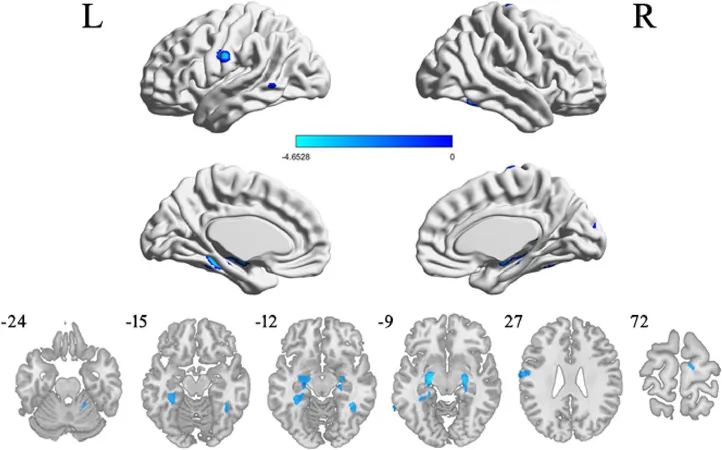
How Liver Fat Disrupts Brain Connections and Impairs Cognition in MASLD Patients
2025-09-19
Author: Rajesh
A Growing Health Crisis: Understanding MASLD
Metabolic Dysfunction-Associated Steatotic Liver Disease (MASLD), formerly known as non-alcoholic fatty liver disease (NAFLD), affects nearly one-third of the global population. This condition results from liver fat accumulation in individuals with metabolic disorders, leading to severe health risks, including cirrhosis and liver cancer.
The Hidden Brain Connection
New research uncovers that the liver-brain axis plays a key role in cognitive and emotional impairments linked to MASLD. Studies suggest a strong correlation between liver fat and cognitive decline, anxiety, and depression, raising concerns about how chronic liver conditions affect mental health.
Revealing the Effects: MRI Insights
Recent MRI studies reveal a significant reduction in brain volume, particularly in areas responsible for cognitive function like the hippocampus. These changes correlate with the severity of liver damage, indicating that liver health directly affects brain structure.
What's Happening in the Brain?
Functional connectivity analyses show that the hippocampus, crucial for memory and emotion, exhibits altered connectivity with the orbitofrontal cortex (OFC), a key region for decision-making and emotional regulation. This disruption may hinder the ability to integrate memories with reward evaluations, which can lead to higher risks of cognitive impairment.
Why It Matters: The Overlap of Physical and Mental Health
The implications of these findings are profound. As liver fat increases, cognitive ability tends to decline, potentially reinforcing a vicious cycle between obesity, cognitive decline, and liver disease. Treating abdominal fat could not only improve metabolic health but also help preserve cognitive function.
A Call to Action for Early Intervention
Identifying cognitive impairments early in MASLD patients is crucial. Innovative neuroimaging techniques could facilitate timely interventions. The overlapping symptoms of cognitive decline and liver disease underscore the need for a holistic approach to treat both conditions effectively.
The Road Ahead: Research and Recovery
By amalgamating structural and functional imaging data, researchers aim to map the intricate connections between liver health and cognitive well-being. This integrative approach could unveil new therapeutic pathways for those affected by MASLD, potentially leading to better outcomes in brain health.
The Future is Now: Addressing the Crisis
Given the alarming rise in MASLD cases, healthcare providers must prioritize education on lifestyle changes to mitigate risks associated with liver disease. Targeting abdominal obesity not only holds promise for physical health but could also pave the way for improved cognitive resilience.
Conclusion: A Multidimensional Challenge
This research illuminates the complexities of MASLD, revealing how liver health intricately influences mental functioning. As our understanding deepens, so too does our potential to address this dual epidemic of metabolic and cognitive decline. The urgent need for collaborative efforts among healthcare professionals, researchers, and patients cannot be overstated.



 Brasil (PT)
Brasil (PT)
 Canada (EN)
Canada (EN)
 Chile (ES)
Chile (ES)
 Česko (CS)
Česko (CS)
 대한민국 (KO)
대한민국 (KO)
 España (ES)
España (ES)
 France (FR)
France (FR)
 Hong Kong (EN)
Hong Kong (EN)
 Italia (IT)
Italia (IT)
 日本 (JA)
日本 (JA)
 Magyarország (HU)
Magyarország (HU)
 Norge (NO)
Norge (NO)
 Polska (PL)
Polska (PL)
 Schweiz (DE)
Schweiz (DE)
 Singapore (EN)
Singapore (EN)
 Sverige (SV)
Sverige (SV)
 Suomi (FI)
Suomi (FI)
 Türkiye (TR)
Türkiye (TR)
 الإمارات العربية المتحدة (AR)
الإمارات العربية المتحدة (AR)